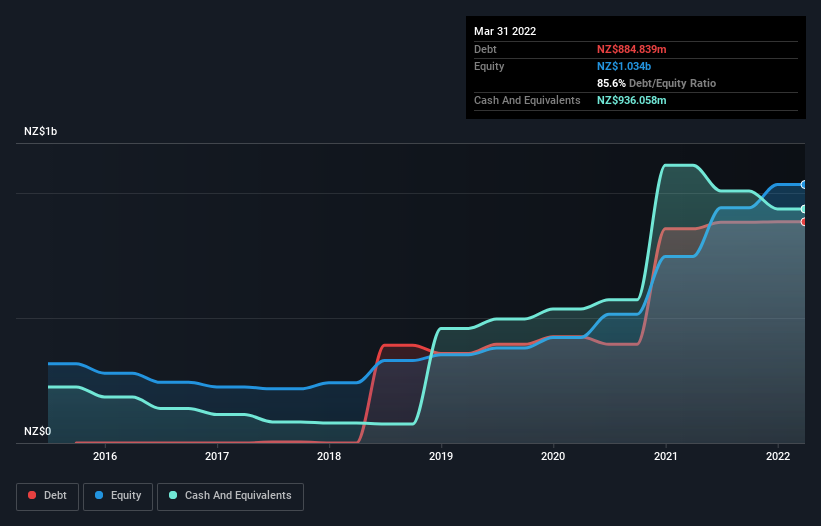We Think Xero (ASX:XRO) Can Stay On Top Of Its Debt
Some say volatility, rather than debt, is the best way to think about risk as an investor, but Warren Buffett famously said that 'Volatility is far from synonymous with risk.' When we think about how risky a company is, we always like to look at its use of debt, since debt overload can lead to ruin. Importantly, Xero Limited (ASX:XRO) does carry debt. But should shareholders be worried about its use of debt?
What Risk Does Debt Bring?
Debt is a tool to help businesses grow, but if a business is incapable of paying off its lenders, then it exists at their mercy. Part and parcel of capitalism is the process of 'creative destruction' where failed businesses are mercilessly liquidated by their bankers. However, a more frequent (but still costly) occurrence is where a company must issue shares at bargain-basement prices, permanently diluting shareholders, just to shore up its balance sheet. Of course, plenty of companies use debt to fund growth, without any negative consequences. The first step when considering a company's debt levels is to consider its cash and debt together.
View our latest analysis for Xero
How Much Debt Does Xero Carry?
The chart below, which you can click on for greater detail, shows that Xero had NZ$884.8m in debt in March 2022; about the same as the year before. However, it does have NZ$936.1m in cash offsetting this, leading to net cash of NZ$51.2m.
How Healthy Is Xero's Balance Sheet?
We can see from the most recent balance sheet that Xero had liabilities of NZ$196.5m falling due within a year, and liabilities of NZ$1.11b due beyond that. Offsetting these obligations, it had cash of NZ$936.1m as well as receivables valued at NZ$61.3m due within 12 months. So its liabilities outweigh the sum of its cash and (near-term) receivables by NZ$312.1m.
Of course, Xero has a market capitalization of NZ$14.4b, so these liabilities are probably manageable. However, we do think it is worth keeping an eye on its balance sheet strength, as it may change over time. While it does have liabilities worth noting, Xero also has more cash than debt, so we're pretty confident it can manage its debt safely.
We saw Xero grow its EBIT by 5.3% in the last twelve months. That's far from incredible but it is a good thing, when it comes to paying off debt. The balance sheet is clearly the area to focus on when you are analysing debt. But ultimately the future profitability of the business will decide if Xero can strengthen its balance sheet over time. So if you're focused on the future you can check out this free report showing analyst profit forecasts.
Finally, a company can only pay off debt with cold hard cash, not accounting profits. Xero may have net cash on the balance sheet, but it is still interesting to look at how well the business converts its earnings before interest and tax (EBIT) to free cash flow, because that will influence both its need for, and its capacity to manage debt. Looking at the most recent three years, Xero recorded free cash flow of 48% of its EBIT, which is weaker than we'd expect. That weak cash conversion makes it more difficult to handle indebtedness.
Summing up
While it is always sensible to look at a company's total liabilities, it is very reassuring that Xero has NZ$51.2m in net cash. And it also grew its EBIT by 5.3% over the last year. So we don't have any problem with Xero's use of debt. Of course, we wouldn't say no to the extra confidence that we'd gain if we knew that Xero insiders have been buying shares: if you're on the same wavelength, you can find out if insiders are buying by clicking this link.
Of course, if you're the type of investor who prefers buying stocks without the burden of debt, then don't hesitate to discover our exclusive list of net cash growth stocks, today.
Have feedback on this article? Concerned about the content? Get in touch with us directly. Alternatively, email editorial-team (at) simplywallst.com.
This article by Simply Wall St is general in nature. We provide commentary based on historical data and analyst forecasts only using an unbiased methodology and our articles are not intended to be financial advice. It does not constitute a recommendation to buy or sell any stock, and does not take account of your objectives, or your financial situation. We aim to bring you long-term focused analysis driven by fundamental data. Note that our analysis may not factor in the latest price-sensitive company announcements or qualitative material. Simply Wall St has no position in any stocks mentioned.

 Yahoo Movies
Yahoo Movies 
